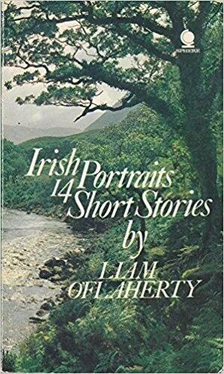“Not here, sir. We’ll be seen.”
The door banged. She gasped and broke loose. Dazed, with his arms stretched out, Mr. Timmins looked up. His nephew was standing at the door. The maid was hurrying out the other door into the hallway. The nephew’s eyes followed her. Then they turned to Mr. Timmins. Mr. Timmins saw them change slowly from wonder to mocking glee.
In a flash the vapours vanished from his brain and he felt a lassitude in all his limbs. He felt old and weak and helpless and ugly; withered and poor.
“Excuse me, Uncle Joe,” said the nephew. “I came in to…”
“Yes,” interrupted Mr, Timmins, sinking into a chair. “You came for that money. How much was it, did you say?”
Louis Quigley crouched over the balustrade of the Upper Circle, shivering in his thin overcoat.
Overhead there was a continual pattering of feet and occasional loud thuds, as the poor people crowded into the gallery, shuffling and talking noisily, jumping along the wide tiers of wooden seats. A respectable stream of shabby genteel people filtered through the Upper Circle seeking their seats rapidly. Below in the Stalls, in the Dress Circle and in the Boxes, sombrely clad men entered slowly, with rigid hips and bored faces, inattentively glancing for their sumptuous seats. The bare powdered bosoms of their women sparkled with jewels. They dropped their luxurious wraps and sank wearily into their seats.
Quigley, leaning against his curved left arm that lay along the red velvet covering of the Upper Circle balustrade, glanced downwards at the rich who entered, with intense hatred in his feverish eyes.
“Drones!” he muttered. “Drones soured by their own luxury!”
The theatre filled, noisily above him, respectfully about him, boredly below him. It was very warm in the theatre. You could smell the artificial heat coming in waves through the brilliantly lighted hall. But Quigley shivered in his thin overcoat.
He had been waiting for two hours at the door in order to get a front seat behind the balustrade. And it had been a cold winter’s night outside; a clear, frosty, starlit sky, overarching the windy streets through which the ill-clad poor went crouching.
His overcoat was buttoned about his throat, enveloping his meagre frame looselv like a bag. A shabby grey cap covered his skull, down over his forehead and pressing his ears outwards. His ears were blue with the cold. His face was small, thin and pale; but there was a fever in his large, blue eyes that illuminated the paltry face and made it terrifying. The face was fixed and the vertical grooves in the skin gathered between the eyes did not twitch. His whole being was transfixed, contemplating the idea in his brain.
The idea had been with him for six days, since he first contemplated the act, in the darkness of his room at night, clutching his knees in bed, thinking. The desire to commit the act had entered his brain suddenly without his knowing it or expecting it. When it came, he had sprung out of bed in terror. He had stood for a long time in his bare feet on the floor, stooping forward, listening. Listening he had become very tired. He had sighed. He had entered his bed again slowly, utterly exhausted. He had fallen asleep almost immediately. But in the morning he awoke to find the idea fixed in his brain; as securely fixed there as if he had been born to commit the act. All the other ideas had gone. He had no further interest in them. He read no more. He spent the six days making preparations for the act.
Watching the people enter he was quite cool. But the tips of the fingers of his left hand were embedded in the soft red velvet of the balustrade covering. And the knuckles of his left hand were white. He waited tensely until the appointed moment should come, without thinking. It seemed to him that his head was made of iron, it felt so strong. It also seemed to him that he was really sitting alone, an immeasurable distance from everybody; that he was enveloped by a cloud; and that he would hurl a thunderbolt out of that cloud, down upon the drones. An avenging God!
Before he hurled the bomb he would utter aloud his prophecy. It would go forth to all the world as a clarion call. The tocsin would be sounded that night. “The blare of trumpets at dawn on the banks of the Po, as the squadrons of Hasdrubal’s Nubian horsemen….” Prophets immolate themselves. His right hand was thrust into his right breast-pocket, between the second and third buttons of his overcoat.
The theatre was full. Now a dull murmur rose as thousands of words mingled in the heated air without form or meaning. People murmuring. Broken waves seething white on a rocky shore, thought Quigley.
The sound pleased him. He fancied that there below, beneath the cloud in which his body was hidden, a concourse of people babbled expectantly, waiting for his word and the sacrifice of blood. “Somewhere and by some one that sacrifice will be made; even by one man armed with a stone.” A bomb was more fitting than a stone, because the reverberation of its explosion would resound through the earth to awake the sleepers, to urge on the tired ones; all, all marching with the prophecy on their lips. His body grew still colder and salty moisture exuded from the corners of his eyes. His eyes blurred and he could see nothing below him. People had sat on either side of him closely. That was all right. Behind him, around him and above him were his own people. Below him were the drones.
Crash! He started violently and then his body relaxed, trembling, as the soft sounds of music rose from the orchestra, the jingle-jingle of the cymbals tintillating, tintil-lating, the weird, melancholy, comic sound of the saxophone, the alternating boom of the drums and the choleric brasses pounding the air; all in harmony mingling. It was the mad laughter of the elements heralding the act.
He was carried away by the sound. His miserable frame collapsed with a loose palsied movement of his weak muscles; rendered incapable by the feverish exaltation of his mind to remain fixed and taut. The crude anger of his idea now changed. It became enveloped with a maniacal joy that transcended it. Lo! The whole theatre was transformed before his eyes. Lo! There in that box to the left of the stage two women had entered, while two men, hidden from his view, seated them. He could see the white hands of the men, with jewels shimmering on their fingers, gestidilating; while the women disposed their dresses and sat upright, laughing backwards at their men. Two tipsy courtesans. One, dark, with firm jaws and rounded, firm breasts, smiled stupidly, while her black eyes ogled her man. The other, with hair the light golden colour of ripe corn, the fecund colour of the fruitful earth, drooped languidly, a beautiful fawn beast exulting in her savage beauty. His blurred eyes gloated over her long stately limbs, loosened with wine and sensuality. Lo! This was not anger but an exulting joy, the slaughter of drones; society had laid before him the most gross and yet exquisite manifestation of its lordly vice so that his act might go forth….
Br-r-r-r. Suddenly the drums of his ears began to hum, deafening him. His cheeks flushed a rosy colour. He half rose from his seat, trembling violently. They made a startled movement about him, shrinking away and looking in awe at his frenzied eyes. Half risen, he smiled and tried to pull forth the bomb to hurl it at the fawn beast, but…
In a moment the humming stopped in his ears. He became aware of the movement about him. This unbalanced him and he fell back into his seat. He wanted to look around him and say something to reassure HIS people. But he was incapable of any action but one, i.e. to hurl the bomb. Already nobody else existed in the world but himself and “the horned spectres of the Revelations” down below. His stomach was becoming ill and all his members were revolting in terror from any movement. And his brain began to be afraid; afraid of the extraordinary and unexpected conduct of his stomach, which was now assuming the mastery over his brain, starting some devilry of its own, expanding and throbbing, as if at the next instant it would explode and annihilate him. Plump! He sat down, closed his eyes and held his breath.
Читать дальше












